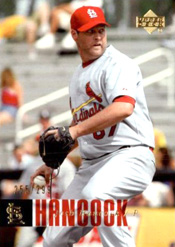Six months after experiencing the euphoria of winning a World Series championship, the Cardinals plunged into despair when relief pitcher Josh Hancock was killed in a highway accident.
 A contributing factor _ Hancock was driving while intoxicated _ raised questions about the club’s substance abuse awareness and led to the Cardinals changing policies regarding alcohol in the clubhouse and on charter flights.
A contributing factor _ Hancock was driving while intoxicated _ raised questions about the club’s substance abuse awareness and led to the Cardinals changing policies regarding alcohol in the clubhouse and on charter flights.
On April 29, 2007, Hancock, 29, was killed when his sports utility vehicle crashed into a parked tow truck on a St. Louis road.
As details emerged, the shaken Cardinals struggled to come to grips with the emotional loss of a teammate and the circumstances that led to his death.
Versatile reliever
Hancock debuted in the big leagues with the 2002 Red Sox and also pitched for the Phillies (2003-04) and Reds (2004-05). After being released by the Reds _ they said he was overweight, the St. Louis Post-Dispatch reported _ Hancock signed with the Cardinals and got a non-roster invitation to spring training in 2006.
Showing an ability to perform multiple bullpen roles, Hancock earned a spot with the 2006 Cardinals and appeared in 62 regular-season games, posting a 3-3 record with one save and a 4.09 ERA.
Hancock didn’t appear in the 2006 World Series _ the Cardinals won four of five against the Tigers to claim the title _ but he earned the respect of manager Tony La Russa and pitching coach Dave Duncan, clinching a spot on the 2007 club.
In eight appearances for the 2007 Cardinals, Hancock was 0-1 with a 3.55 ERA. His final appearance was on Saturday afternoon, April 28, when he pitched three innings against the Cubs at St. Louis. Boxscore
After the game, Hancock met friends at Mike Shannon’s Steaks and Seafood restaurant in downtown St. Louis.
When Hancock got ready to leave, restaurant manager Pat Shannon, daughter of Mike Shannon, the Cardinals broadcaster who operated the establishment, told the Post-Dispatch she offered to call a cab for Hancock, but he declined, saying he would walk to the Westin Hotel.
Fatal decisions
At about 12.30 a.m. on Sunday, April 29, Hancock got into his rented 2007 Ford Explorer, left downtown and headed to suburban Clayton, where he was planning to meet teammates Jim Edmonds, Ryan Franklin, Gary Bennett and Adam Kennedy at a cafe, according to the Post-Dispatch.
Hancock, driving on Highway 40, was speeding at 68 mph in a 55 mph zone, according to St. Louis police, and he was talking on a cell phone to a woman who was seeking game tickets. Hancock’s blood alcohol level was 0.157 percent _ nearly twice the legal limit, police said.
As Hancock got near the Forest Park/Grand exit, he came upon a flatbed tow truck that was parked in the left lane. The tow truck, responding to an earlier accident, was flashing its emergency lights.
The driver, Jacob Hargrove, was inside the cab of the tow truck. When he saw Hancock’s vehicle in his rearview mirror, he honked the truck’s horn as a warning. Hancock kept barreling forward. At the last second, police said, Hancock tried to veer right, but was too late.
The Ford Explorer slammed into the right rear of the tow truck. Hargrove wasn’t hurt. Hancock, who wasn’t wearing a seat belt, died instantly of massive head trauma, police said.
Joe Walsh, Cardinals director of security, who was called to the scene to provide positive identification, told the Post-Dispatch, “If I hadn’t known him, I would have had a very tough time” identifying Hancock.
A tin of marijuana was found inside Hancock’s vehicle, police said.
“Evidently, whether it was the cell phone usage, the impairment of the alcohol, or the speed, he didn’t try to change lanes” in time, said St. Louis police chief Joe Mokwa.
Shock in St. Louis
At about 4 a.m., Walsh informed Cardinals president Mark Lamping and general manager Walt Jocketty of Hancock’s death. La Russa called Hancock’s father in Mississippi and delivered the news.
“The pain our organization feels today is unspeakable,” said Cardinals owner Bill DeWitt.
The Cubs agreed to the Cardinals’ request to call off their April 29 game that Sunday afternoon at Busch Stadium.
Hancock, single, was survived by his parents, a sister and a brother. A memorial service was scheduled for Thursday, May 3, in Tupelo, Miss. DeWitt arranged for a charter flight to take the team to the service after they played a three-game series against the Brewers at Milwaukee.
Signs of trouble
While the Cardinals were in Milwaukee, the Post-Dispatch reported Hancock had been involved in another accident three days before his death.
At 5:30 a.m. on Thursday, April 26, Hancock was driving a GMC Denali when, according to a police report, he edged the vehicle into an intersection in Sauget, Ill., and was struck by a tractor-trailer truck. The front bumper of Hancock’s vehicle was torn off.
Hancock, uninjured, arrived late in the Cardinals clubhouse for that afternoon’s game against the Reds at Busch Stadium. La Russa later said he reprimanded Hancock for being late, but didn’t know about the accident.
In Milwaukee, as reporters dug for details, a defensive La Russa said he would swing a fungo bat at any journalist he believed was asking questions with “insincerity.”
A month earlier, La Russa had been arrested in Jupiter, Fla., the Cardinals’ spring training home, and charged with driving under the influence. His situation was drawing media scrutiny about his ability to effectively deal with players regarding alcohol issues.
The Post-Dispatch revealed some of Hancock’s teammates had spoken to the pitcher about his drinking.
Rest in peace
The shell-shocked Cardinals lost all three of their games in Milwaukee and returned to St. Louis on May 2. The next morning, the Cardinals flew to Mississippi for Hancock’s memorial service.
DeWitt gave the Hancock family a framed photo of the pitcher, a replica of the 2006 World Series ring and an American flag that flew over Busch Stadium during Hancock’s final game, the Post-Dispatch reported.
Relief pitcher Randy Flores was the only member of the Cardinals to speak during the service.
A day later, May 4, Cardinals management said the club would ban alcohol from their Busch Stadium clubhouse and on charter flights returning to St. Louis.
Previously: Aaron Miles keyed Cardinals’ comebacks of 2006

“If I hadn’t known him, I would have had a very tough time” identifying Hancock.
Jesus, that was painful to read.
Horrific.
Sent from my iPhone
>